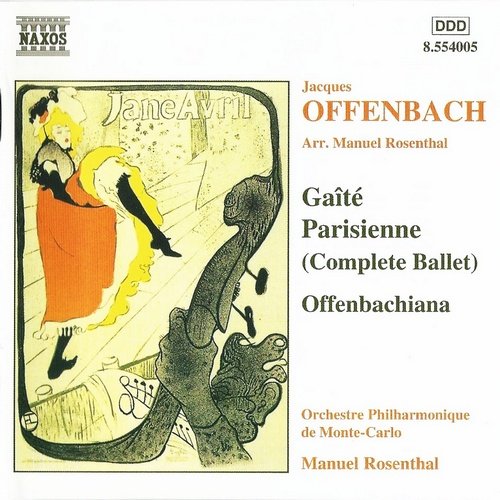
Orchestre Philharmonique de Monte-Carlo, Manuel Rosenthal - Offenbach - Gaite Parisienne (1999)
BAND/ARTIST: Orchestre Philharmonique de Monte-Carlo, Manuel Rosenthal
- Title: Offenbach - Gaite Parisienne
- Year Of Release: 1999
- Label: Naxos
- Genre: Classical
- Quality: FLAC (image+.cue,log,scans)
- Total Time: 67:54
- Total Size: 349 Mb
- WebSite: Album Preview
Tracklist:
Gaîté Parisienne (after J. Offenbach) [1938]
1. Ouverture 00:02:45
2. 1. Allegro brillante 00:01:16
3. 2. Polka 00:01:55
4. 3. Poco allegro - A tempo de Landler 00:02:05
5. 4. Mazurka 00:02:54
6. 5. Valse 00:02:13
7. 6. Allegro 00:01:20
8. 7. Polka 00:01:49
9. 8.Valse lente 00:03:54
10. 9. Tempo di marcia 00:01:45
11. 10. Valse moderato 00:02:14
12. 11. Vivo 00:00:14
13. 12. Valse 00:02:30
14. 13. Allegro molto 00:02:41
15. 14. Valse 00:03:31
16. 15. Allegro 00:00:30
17. 16. Cancan 00:02:24
18. 17. Quadrille 00:00:56
19. 18. Allegro 00:00:59
20. 19. Allegro moderato 00:00:46
21. 20. Allegro 00:00:28
22. 21. Allegro 00:01:10
23. 22. Vivo 00:01:17
24. 23. Barcarolle 00:04:34
Offenbachiana (arr. Manuel Rosenthal) [1953]
25. Ouverture - Barbe - Bleu 00:03:08
26. 1. La Grande - Duchesse de Gerolstein 00:02:10
27. 2. Barbe - Bleu - La Fille du Tambour - Majeur 00:06:37
28. 3. La Vie Parisienne - La Grande - Duchesse de Gerolstein - Barbe - Bleu 00:09:46
Performers:
Orchestre Philharmonique de Monte-Carlo
Manuel Rosenthal - conductor
Gaîté Parisienne (after J. Offenbach) [1938]
1. Ouverture 00:02:45
2. 1. Allegro brillante 00:01:16
3. 2. Polka 00:01:55
4. 3. Poco allegro - A tempo de Landler 00:02:05
5. 4. Mazurka 00:02:54
6. 5. Valse 00:02:13
7. 6. Allegro 00:01:20
8. 7. Polka 00:01:49
9. 8.Valse lente 00:03:54
10. 9. Tempo di marcia 00:01:45
11. 10. Valse moderato 00:02:14
12. 11. Vivo 00:00:14
13. 12. Valse 00:02:30
14. 13. Allegro molto 00:02:41
15. 14. Valse 00:03:31
16. 15. Allegro 00:00:30
17. 16. Cancan 00:02:24
18. 17. Quadrille 00:00:56
19. 18. Allegro 00:00:59
20. 19. Allegro moderato 00:00:46
21. 20. Allegro 00:00:28
22. 21. Allegro 00:01:10
23. 22. Vivo 00:01:17
24. 23. Barcarolle 00:04:34
Offenbachiana (arr. Manuel Rosenthal) [1953]
25. Ouverture - Barbe - Bleu 00:03:08
26. 1. La Grande - Duchesse de Gerolstein 00:02:10
27. 2. Barbe - Bleu - La Fille du Tambour - Majeur 00:06:37
28. 3. La Vie Parisienne - La Grande - Duchesse de Gerolstein - Barbe - Bleu 00:09:46
Performers:
Orchestre Philharmonique de Monte-Carlo
Manuel Rosenthal - conductor
Everyone knows Offenbach's famous "Can-can" from the operetta Orpheus in the Underworld, but how many casual listeners have heard it in its original version, as a chorus of demons(!) in Hades? In fact, the version best known is this one, as arranged for the ballet Gaîté Parisienne by the delightful French composer and conductor Manuel Rosenthal. The work has been a staple of the Monte-Carlo ballet for about six decades, and Naxos has assembled the orchestra that knows it best for what amounts to a brand-new, original cast production, led by none other than the 95 years young Rosenthal. The results are as fresh and vivacious as the music itself, and the inclusion of the 1953 Offenbachiana effectively offers a complete survey of the great 19th century operetta composer's most memorable tunes, as seen through the insouciant musical syntax of the generation of Stravinsky and "Les Six". It was Stravinsky, in fact, who fought for Rosenthal's ballet after it was initially rejected, and Stravinsky always knew a good thing when he heard it. What better recommendation could you ask for? -- David Hurwitz, ClassicsToday
Classical | FLAC / APE | CD-Rip
As a ISRA.CLOUD's PREMIUM member you will have the following benefits:
- Unlimited high speed downloads
- Download directly without waiting time
- Unlimited parallel downloads
- Support for download accelerators
- No advertising
- Resume broken downloads


